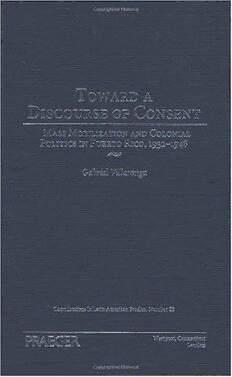
Toward a Discourse of Consent: Mass Mobilization and Colonial Politics in Puerto Rico, 1932-1948 (Contributions in Latin American Studies) PDF
296 Pages·2004·18.415 MB·English
Most books are stored in the elastic cloud where traffic is expensive. For this reason, we have a limit on daily download.
Preview Toward a Discourse of Consent: Mass Mobilization and Colonial Politics in Puerto Rico, 1932-1948 (Contributions in Latin American Studies)
Description:
A familiar feature of analyses about mass mobilization in Latin America between the 1930s and 1950s is an emphasis on manipulation and social control of leaders over their constituencies. This book addresses mass mobilization from a different angle by focusing less on the unidirectional action of leaders and the passivity of their followers and more on the interactive process between agents that informed their support for reform and the articulation of a political discourse based on notions of consent. To understand how consent produced a situation most beneficial for political leaders but effectively shaped by followers, Villaronga this book focuses on the interaction between American authorities, the Popular Democratic Party (PPD), and its multiple supporters that informed colonial politics in Puerto Rico between 1932 and 1948.
See more
The list of books you might like
Most books are stored in the elastic cloud where traffic is expensive. For this reason, we have a limit on daily download.
